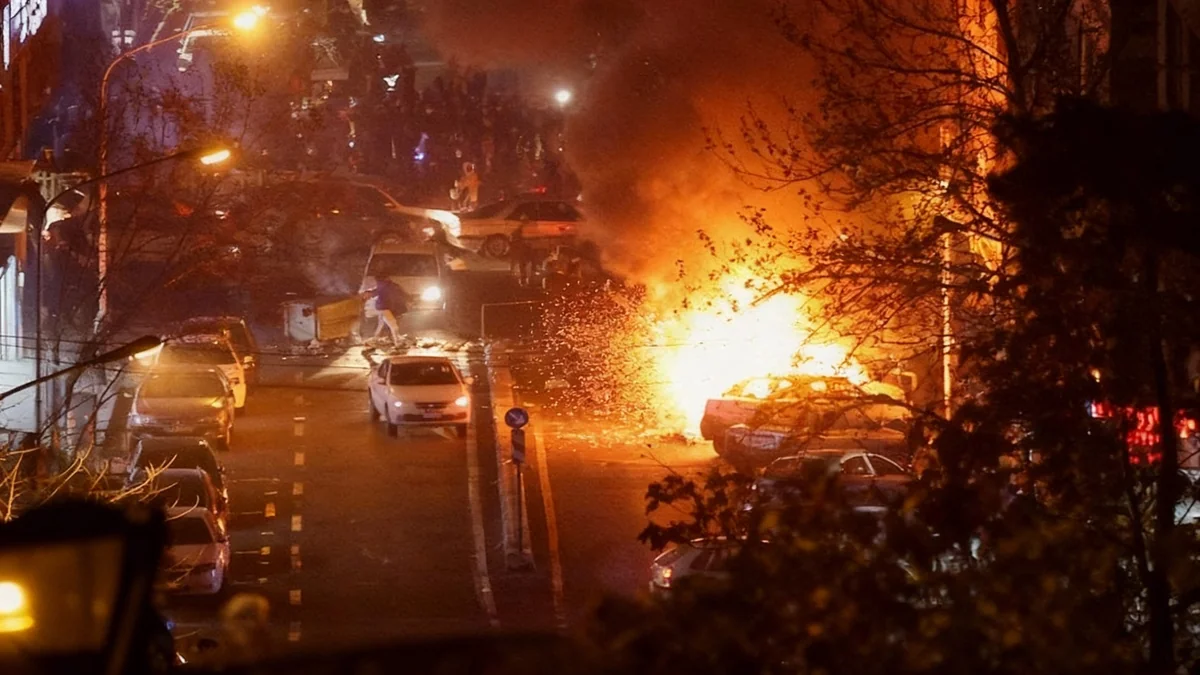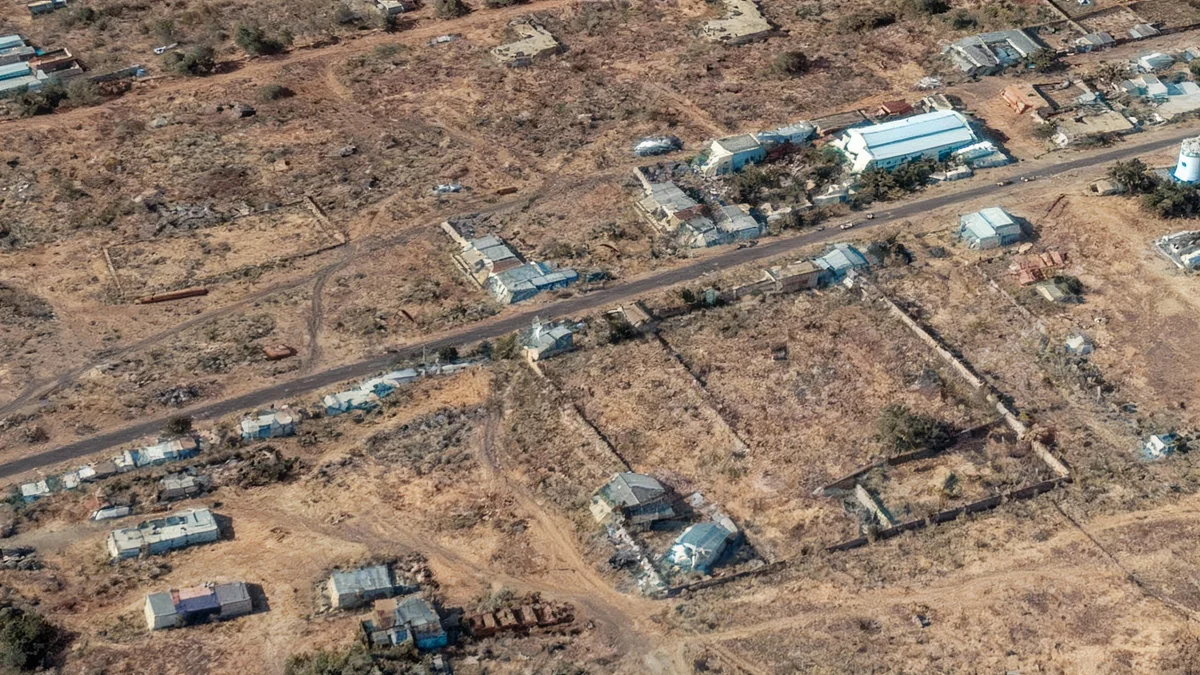Recent global events highlight critical developments in space technology, ongoing conflicts, and the rapidly evolving landscape of artificial intelligence governance. The United States has launched new probes to enhance space weather monitoring, while India faces continued challenges from Maoist rebels. Simultaneously, world leaders are addressing the urgent need for international cooperation on AI regulation.
Key Takeaways
- Three new US spacecraft will improve predictions for solar storms, which can impact Earth's infrastructure.
- Indian security forces continue operations against Maoist rebels despite a declared ceasefire offer.
- The United Nations is establishing new bodies for AI governance, though their practical power remains a subject of debate.
- Donald Trump's shift in rhetoric on Ukraine has prompted calls for Europe to increase its defense contributions.
- French towns have defied government orders by flying Palestinian flags, highlighting a debate on neutrality.
US Launches Probes to Monitor Space Weather
The United States successfully launched three spacecraft on Wednesday from Florida's Kennedy Space Center. These probes are designed to enhance the monitoring of space weather, particularly solar storms. Solar storms can interfere with critical technology and power systems on Earth, posing risks to modern infrastructure.
The Falcon 9 rocket, built by SpaceX, carried the probes into orbit. Their mission involves a journey to the Lagrange 1 point, located approximately 1.5 million kilometers (930,000 miles) from the Sun. This stable observation point offers an ideal vantage for studying solar activity.
Space Weather Impact
- Solar storms are high-radiation events.
- They originate from flares on the Sun's surface.
- Prediction is currently very difficult.
- Impacts can include aviation, mobile communications, and power grids.
- Astronauts and satellites in space are also at risk.
Understanding Solar Activity
One of the primary instruments, the Interstellar Mapping and Acceleration Probe (IMAP), will study high-energy particles from the Sun. It will also examine the heliosphere, the protective magnetic bubble that surrounds our solar system. Data from IMAP will offer crucial insights into space weather patterns and cosmic radiation levels.
The Space Weather Follow-on (SWFO-L1) spacecraft, operated by the National Oceanic and Atmospheric Administration (NOAA), focuses on early detection of these weather patterns. Irene Parker of NOAA stated,
"It can't stop an incoming threat, but it can give us time to prepare."
Early warnings could allow authorities to take preventative measures. These include sheltering astronauts, alerting aircraft pilots to potential GPS disruptions, and adjusting power grids to minimize damage. The third passenger, the Carruthers Geocorona Observatory, will study Earth's exosphere to better understand how space weather influences it.
Indian Forces Confront Maoist Rebels
Indian security forces have killed five Maoist rebels, including two senior commanders, in recent operations. These actions mark a significant engagement since the guerrillas announced a unilateral ceasefire last week. New Delhi has committed to eliminating the Maoist rebellion by March 2026.
The recent gunbattles occurred in Jharkhand and Chhattisgarh, regions within the "Red Corridor." Police Inspector General Michaelraj S. reported that "Three members of the Jharkhand Jan Mukti Parishad (JJMP) were killed today in a gunbattle with security forces." The JJMP is a splinter group of the Naxalite movement, which began nearly six decades ago.
Maoist Rebellion Background
The Naxalite movement draws inspiration from Maoist ideology. It started in 1967 when villagers rose against feudal lords. At its peak in the mid-2000s, the rebellion controlled nearly a third of India's territory with an estimated 15,000 to 20,000 fighters. However, its strength has declined significantly in recent years.
Recent Engagements and Government Stance
Last week, the Maoists stated they were suspending their armed struggle and offered talks with the government. Authorities, however, were still verifying the sincerity of these claims. On Monday, security forces killed two high-ranking Maoist leaders, Katta Ramachandra Reddy and Kadri Satyanarayan Reddy, in central India's Abujhmad region.
These two leaders were reportedly active for three decades and were linked to numerous deadly attacks on security forces. Home Minister Amit Shah commented on social media,
"Our security forces are systematically dismantling the top leadership of the Naxals, breaking the backbone of red terror."
Maoists have offered talks before, including a ceasefire proposal in February that authorities rejected. Since last year, nearly 450 Maoist rebels have been killed. The conflict has resulted in over 12,000 deaths among rebels, soldiers, and civilians since 1967.
United Nations Addresses AI Governance
Artificial intelligence (AI) has become a major global challenge for world leaders meeting at the United Nations. Since ChatGPT's launch about three years ago, AI's rapid advancements have surprised many. Tech companies continue to develop new AI systems, while experts warn of potential risks.
These risks include engineered pandemics, widespread misinformation, and AI systems operating without control. Calls for safeguards have grown louder. The UN's recent adoption of a new governance framework represents a significant effort to manage AI's development and deployment.
Global Efforts and New UN Bodies
Previous multilateral efforts, such as AI summits organized by Britain, South Korea, and France, have only led to non-binding commitments. Last month, the UN General Assembly passed a resolution to create two key AI bodies: a global forum and an independent scientific panel of experts. This is considered a milestone for global AI governance.
On Wednesday, the UN Security Council held an open debate on AI. Discussions focused on how the Council can ensure AI is used responsibly, complies with international law, and supports peace and conflict prevention. On Thursday, UN Secretary-General António Guterres launched the Global Dialogue on AI Governance.
This forum will provide a venue for governments and other stakeholders to discuss international cooperation and share solutions. It is scheduled to meet formally in Geneva next year and in New York in 2027. Recruitment for 40 experts for the scientific panel, including two co-chairs (one from a developed country and one from a developing nation), is expected to begin soon.
AI Governance Challenges
- Fast-moving technology versus slow administrative processes.
- Need for internationally binding agreements.
- Establishing "red lines" for AI development.
- Ensuring developer responsibility for safety.
Concerns and Proposed Solutions
The new UN bodies are seen as a "symbolic triumph" and the "most globally inclusive approach to governing AI," according to Isabella Wilkinson of Chatham House. However, she noted that "in practice, the new mechanisms look like they will be mostly powerless." A key concern is whether the UN's administrative structure can effectively regulate a rapidly evolving technology like AI.
Ahead of the meeting, a group of influential experts called for governments to agree on "red lines" for AI by the end of next year. They argue that AI needs "minimum guardrails" to prevent "most urgent and unacceptable risks." This group, which includes senior employees from OpenAI, DeepMind, and Anthropic, advocates for an internationally binding agreement on AI.
Stuart Russell, a computer science professor and director at UC Berkeley's Center for Human Compatible AI, supports this idea.
"As we do with medicines and nuclear power stations, we can require developers to prove safety as a condition of market access,"Russell explained. He suggested UN governance could resemble the International Civil Aviation Organization, coordinating safety regulators globally. Russell also proposed a flexible "framework convention" that can adapt to AI's ongoing advances, rather than rigid, static rules.
Trump's Ukraine Shift Prompts European Calls for Action
The Kremlin stated it must continue its military offensive in Ukraine, rejecting US President Donald Trump's description of Russia as a "paper tiger." Trump's remarks followed a meeting with Ukrainian President Volodymyr Zelensky, where he suggested Ukraine could regain all its territory. This marks a significant change in Trump's previous stance on the three-and-a-half-year conflict.
Kremlin spokesman Dmitry Peskov said, "We are continuing our special military operation to ensure our interests and achieve the goals" set by President Putin. He added, "We are doing this for both the present and the future of our country. For many generations to come. Therefore, we have no alternative." Russia launched its full-scale offensive in February 2022, aiming to capture Kyiv and remove Zelensky.
Conflict Overview and Russian Response
The conflict has caused tens of thousands of deaths, devastated parts of eastern and southern Ukraine, and displaced millions. Russia currently controls about one-fifth of Ukraine, including Crimea, annexed in 2014. Both armies have experienced heavy losses as Russia continues to advance.
Trump's Tuesday comments also dismissed Russia's military strength and mocked its failure to defeat Ukraine quickly. On Truth Social, he wrote that Ukraine might "be able to take back their Country in its original form and, who knows, maybe even go further than that."
Russia reacted strongly to the "paper tiger" accusation. Peskov clarified that the phrase was used in relation to Russia's economy. "Russia is more associated with a bear. And paper bears don't exist. Russia is a real bear," he stated. However, he admitted that Russia's economy faces challenges, including slowing growth and persistent inflation after two years of rapid expansion.
Moscow's finance ministry proposed raising sales tax next year to cover the costs of the offensive, which has led to a budget deficit. Kyiv and Washington are working to cut off Russia's revenue from energy exports to further pressure the Kremlin. Peskov also noted that efforts to improve US-Russia relations since Trump's return to the White House have yielded "close to zero" results.
European Reaction and Future Support
Ukrainian President Zelensky welcomed Trump's shift as a "big change." However, it remains unclear if Trump will follow through with concrete actions, such as additional sanctions that Kyiv has requested. In Kyiv, some expressed skepticism. Bogdan Tkachuk, 33, said, "It's just another opinion from Trump, which changes every hour."
Svitlana Fetisova, whose son died at the front, called for "more help, more action, not just words, because Ukraine is suffering." She added, "I really want to believe that this is true and that finally the country responsible for the balance of peace in the whole world will turn to us."
Germany's Foreign Minister Johann Wadephul urged Europe to "grow up" and increase support for Ukraine. Speaking to Deutschlandfunk radio, Wadephul suggested Trump realized his efforts to persuade Putin had failed. He noted that Trump's remarks were positive for both Ukraine and Europe, as the president "must indeed acknowledge that his considerable efforts with Putin have so far been unsuccessful."
Wadephul cautioned that increasing European security efforts would be challenging. Anonymous officials also suggested Trump might be signaling that Europe must now take primary responsibility for aiding Ukraine. A Western European official commented, "He seems to be saying his goodbyes, no? But that can change tomorrow. In any case: the cards are clear for us. We know what we should be doing." A senior Eastern European diplomat agreed, believing Trump's comments aimed to show a change in position and indicate "that it is Europe's question."
Trump's social media post mentioned, "With time, patience, and the financial support of Europe and, in particular, NATO, the original Borders from where this War started, is very much an option." The US has been Ukraine's largest single supporter. However, Trump has consistently pushed Europe to bear a greater share of its defense burden. European NATO members have increased defense spending and supplied Ukraine with air defense systems using NATO funds. The European Union is also considering using frozen Russian assets to boost financial aid to Ukraine.
French Towns Defy Orders, Fly Palestinian Flags
Following French President Emmanuel Macron's recognition of Palestinian statehood this week, dozens of town halls across France displayed the Palestinian flag. This action defied instructions from Macron's interior ministry, which had prohibited such displays.
By Wednesday, some towns had removed the flags after regional authorities initiated legal proceedings. Several mayors expressed that these actions undermined the message of solidarity Macron intended with his largely symbolic recognition. Raphael Adam, mayor of Nanterre, near Paris, told Reuters,
"For me it's a complete misunderstanding. You can't have a government asking its representatives to oppose raising a flag at the same time it's recognizing the state."
Legal Challenges and Claims of Double Standards
Nanterre raised the flag in a ceremony on Monday. However, a day later, the Nanterre administrative court ruled for its removal. This followed the city's defiance of an order from the regional representative, known as the prefect, to take down the flag. French law prohibits public buildings from being used to express political, religious, or philosophical opinions.
Local officials pointed out perceived inconsistencies, noting that Ukrainian flags have been displayed on public buildings, and even projected onto the Eiffel Tower. Gilles Poux, mayor of La Courneuve, northeast of Paris, planned to remove his town's flag after his administration was fined for flying one earlier this year. "When we raised a Ukrainian flag, no one told us anything!" Poux said, adding, "Speaking of neutrality is hypocritical. Liberty, equality, fraternity: there's nothing neutral about these values."
The interior ministry responded to allegations of double standards by stating that the Gaza war had caused protests and tensions in France. They argued that displaying Palestinian flags on public buildings could trigger public unrest. As of Tuesday night, 86 town halls across France had flown the Palestinian flag, according to the interior ministry. Last week, the ministry had instructed regional government representatives to block such moves, citing France's "neutrality principle."
Anne Tuaillon, head of the France Palestine Solidarity Association, asserted that there is no room for neutrality "in a situation of oppression," referring to Israel's military actions in Gaza since the 2023 Hamas attack. Lionel Crusoe, a lawyer specializing in French public law, found the interior ministry's ruling questionable. He stated, "This neutrality principle for public services does not prevent a municipality from being able to occasionally show solidarity toward a people who are the target of a military aggression, or a terrorist attack, for example."




